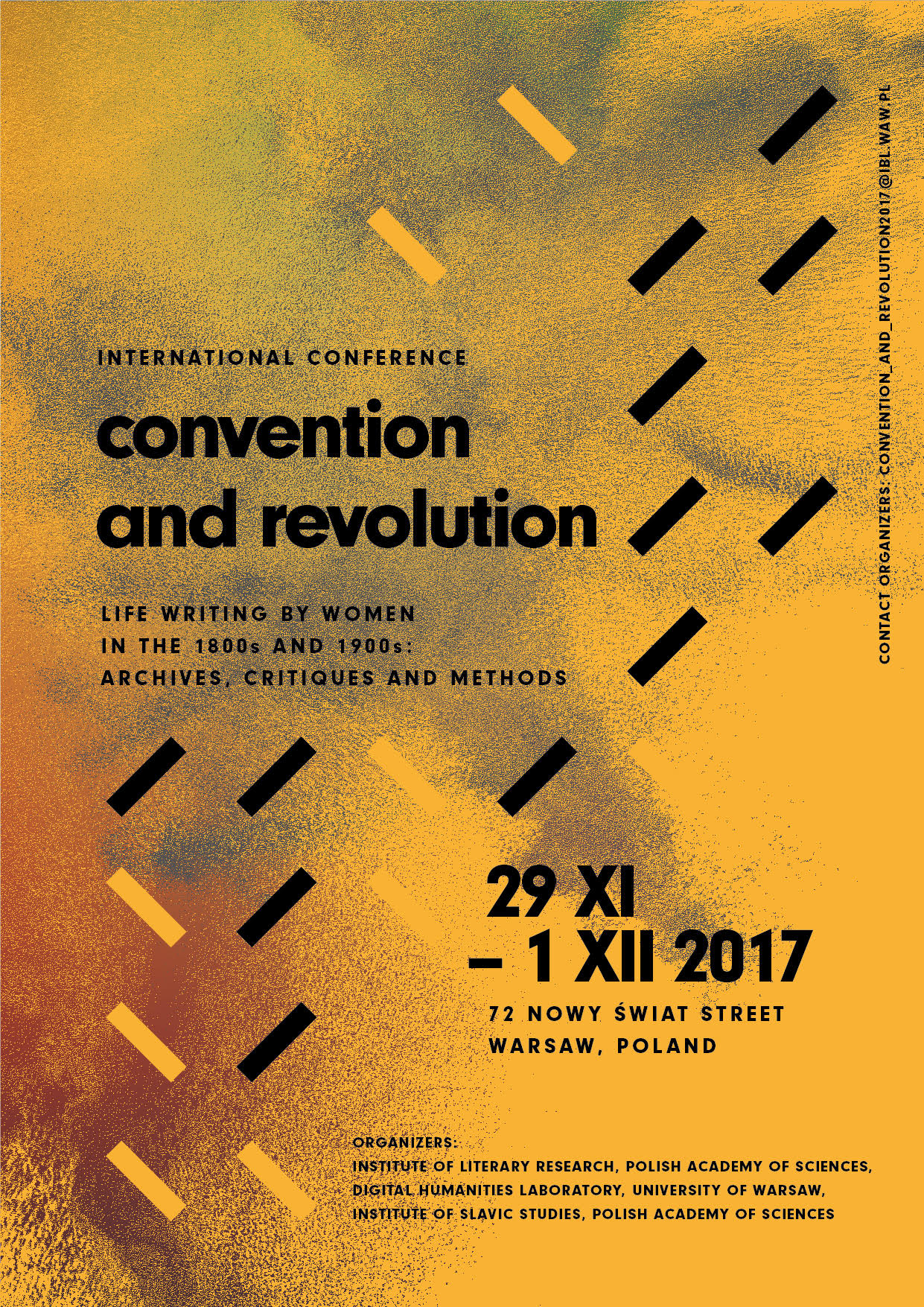Wydarzenie
Convention and Revolution: Life writing by women in the 1800s and 1900s: archives, critiques and methods
PROGRAMME
November 29th-December 1st, 2017
November 29th, 2017 (Wednesday)
Room 144
9.15-9.45
REGISTRATON
9.45-10.00
OPENING & WELCOME
Mikołaj Sokołowski
(Head of the Institute of Literary Research, PAS)
10.00-11.30
KEYNOTE LECTURE Philippe Lejeune, The personal journal of Émilie Serpin (1863-1881)
Chair: Anna Nasiłowska, Mikołaj Sokołowski
11.30-11.45
COFFEE BREAK
11.45-12.45
Monika Rudaś-Grodzka, Katarzyna Nadana-Sokołowska, Ewa Serafin-Prusator, Emilia Kolinko, Marta Taperek, Project: The Women’s Archive: Writing
Chair: Anna Nasiłowska
12.45-13.15
COFFEE BREAK
13.15-15.15
PANEL I
Chair: Dobrochna Kałwa
Marta Taperek, How Many Hands Has Been Involved in Making This Manuscript? The Confession of an Archivist Lucyna Marzec, In Private Archives
Svetlana Tomic, “Inferior” Researchers of the “Marginal” Subject
Grace Pundyk, Reading the Invisible: Letters between the Living and the Dead
16.30-18.00
PANEL II
Chair: Katarzyna Stańczak-Wiślicz
Anna Pekaniec, Strategies of Writing a Letters/Strategies of Creating Identity in Letters Written by Eliza Krasińska née Branicka
Maria Berkan-Jabłońska, Portrait and Self-Portrait of a Woman on the Basis of the Printed and Handwritten Literary Output of Sabina Grzegorzewska née Gostkowska
Tiina Kinnunen, Feminist Biographies as Sources for a Feminist Biography: Methods of Reading Biographies as Political Texts
Grażyna Kubica, Personal Ethnographic Writing of Polish Women-Authors
19.00
GALA DINNER
November 30th, 2017 (Thursday)
9.30-10.30 (Room 144)
KEYNOTE LECTURE Cynthia Huff, Mind the Gaps: Victorian Women Writing Subversion into the Archive
Chair: Lucyna Marzec, Katarzyna Nadana-Sokołowska
10.30-10.45
COFFEE BREAK
10.45-12.45
PANEL III (Room 132)
Chair: Lucyna Marzec
Edyta Pętkowska, Maria and Mary – from Literature to Parallel Biographies
Magdalena Ożarska, Mary Shelley’s and Claire Clairmont’s Self-Writing about Reading
Karolina Krasuska, Mina Loy and the Function of the Autobiographical
PANEL IV (Room 144)
Chair: Anna Michalska
Anne Y. Brinton, The Missionary’s Wife: Martha Foster Crawford and the Politics of Rebellion Natalia Voloshkova, Aspiring to Freedom: Mary Hamilton’s Life Writing at the Crossroads of the Two Centuries
Pedro Urbano, The Forgotten Journals of D. Maria Constança da Câmara, Marchioness of Fronteira
Zsuzsa Török, Scribal Publication: A Nineteenth Century Alternative. The Diaries of Baroness Jozefa Wesselényi
12.45-13.15
COFFEE BREAK
13.15- 15.00 (Room 144)
KEYNOTE LECTURE
Sidonie Smith and Julia Watson, The Archives of Those Who Write Themselves: What and Where Are the Issues?
Chair: Natalia Judzińska, Anna Nasiłowska
17.00-19.00
PANEL V (Room 132)
Chair: Anna Nasiłowska
Anna Dżabagina, The Mourning Diaries: Hanna Nałkowska’s Journal from 1942 to 1945 in the Light of Zofia Nałkowska’s Literary Wartime Diaries Julia Lewandowska, Passions of the Soul: Mystic Experience in the Early Modern Nun´s Spiritual Autobiographies as Dissident Languages
Ewa Krzywaźnia-Bachryj, Faces of Disagreement. Women towards their Submission and Males Domination in the Light of Selected Memoirs
PANEL VI (Room 144)
Chair: Jolanta Żyndul
Samira Saramo, From “Iron Women” to Ironing Women: Reading the Extraordinary and the Everyday in Finnish Immigrant Women’s Life Writing
Katarzyna Czerwonogóra, Between Europe and Palestine: Women’s Autobiographies as Sources for Writing a New History of Zionism
Alexis Peri, Friendship amidst Cold War: Soviet and American Pen Pals
Anna Frączek, Letters of Galician Rural Women to the Editors of the “Piast” during the First World War
December 1st, 2017 (Friday)
9.30- 11.00 (Room 144)
Sidonie Smith and Julia Watson, Workshop: The Archives of Those Who Write Themselves: What and Where Are They?
11.00-11.15
COFFEE BREAK
11.15- 12.15
KEYNOTE LECTURE (Room 144)
Andrea Pető, Life Story of Julia Rajk Revisited: Afterlife of a Biography
Chair: Katarzyna Stańczak-Wiślicz, Marta Taperek
12.15-12.45
COFFEE BREAK
12.45-14.15
PANEL VII (Room 144)
Chair: Karolina Krasuska
Andrea Feldman, Ivana Brlić Mažuranić: Trauma and Duties of a Fairy Tale Writer
Khola Waheed, A Tale of Two Novels. A Comparative Study of Emma’ and My Feudal Lord
Natalia Jakubova, Constructions of Parenthood in the Autobiographical Writings of Irena Solska (1875-1958)
PANEL VIII (Room 132)
Chair: Barbara Klich-Kluczewska
Natalie Cornett, The Secret World of Female Letters: The Case of Narcyza Żmichowska and the Enthusiasts of Nineteenth-Century Poland
Katarzyna Nadana-Sokołowska, Adela Kieniewiczowa’s Diary’s Keeping – Functions of the Practice
Marzena Boniecka, The Room of Aniela Gruszecka
14.15-14.45
COFFEE BREAK
14.45-16.15
PANEL IX (Room 144)
Chair: Joanna Partyka
Siobhan Hearne, Prostitutes as Petitioners: Correspondence between Registered Women and the Authorities in Late Imperial Russia
Tanya Chebotarev, Bridging the Gap: Iraida Barry in Istanbul (1920s-1950s)
Marijana Kardum, Vinka Bulić’s Diary 1929-1934: Women’s Chronicle of the Royal Dictatorship
16.15-16.30
CONFERENCE RECAP
CONFERENCE VENUE:
Staszic Palace, Institute of Literary Research of the Polish Academy of Sciences, Warsaw, 72 Nowy Świat Street

Organizers: Institute of Literary Research, Polish Academy of Sciences, Digital Humanities Laboratory, University of Warsaw, Institute of Slavic Studies, Polish Academy of Sciences
Informacje
Zobacz także
International Conference "Convention and Revolution. Life writing by women in the 1800s and 1900s: archives, critiques and methods"
Organizers: Institute of Literary Research of the Polish Academy of Sciences, Digital Humanities Laboratory of the University of Warsaw, Institute of Slavic Studies of the Polish Academy of Sciences
Jagiellonians Heritage: Perspecives of International Research [Dziedzictwo Jagiellonów: perspektywy badań międzynarodowych]
Międzynarodowa konferencja naukowa z udziałem badaczy z Polski, Finlandii, Szwecji, Litwy i Wielkiej Brytanii odbyła się w ramach projektu Dziedzictwo Jagiellonów jako płaszczyzna dialogu między Polską a Finlandią, realizowanego przez Instytut Badań Literackich PAN we współpracy z Uniwersytetem w Jyväskylä.
CoHLIT-21 German Seminar / March 9-10, 2022 (Leibniz-Zentrum für Literatur- und Kulturforschung, Berlin)
The CoHLIT-21 seminar on contemporary German-language literature and the Holocaust will take place in a hybrid format.
Transformations of Shoah Trauma in Post-2000 Literatures
In the eighty years since the end of the Second World War, perspectives on the Shoah have evolved significantly, shaped by geopolitical and social factors. ese shifts have encompassed periods of silence, an inability or unwillingness to process the catastrophe´s exceptional scale, and movements toward visibility, fascination, marginalization, denial, privatization, instrumentalization and commercialization. As historical distance grows, new generations of writers, artists, and scholars face the challenge of representing this trauma in ways that engage contemporary audiences while remaining anchored in historical memory.